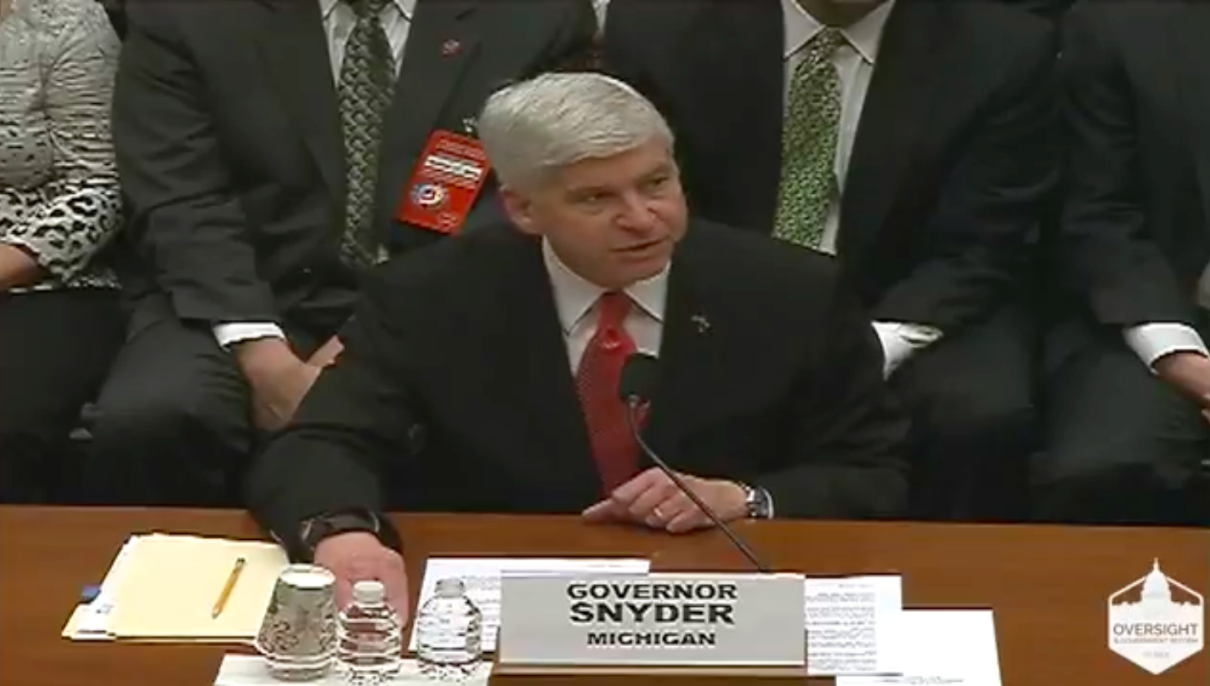Gov. Snyder Finally Testified About the Flint Water Crisis

By:
Michigan Gov. Rick Snyder was called before Congress for the first time on Thursday to testify about his role in the Flint water crisis, which has exposed thousands of citizens to potential lead poisoning. In his heated testimony, Snyder denied ignoring red flags from staffers that could have prevented the public health disaster, but ultimately accepted responsibility for the ordeal.
"Not a day or night goes by that this tragedy doesn't weigh on my mind — the questions I should have asked, the answers I should have demanded," Snyder said.  YouTube - youtube.com
YouTube - youtube.com
U.S. House Oversight and Government Reform Committee's third hearing on the issue, members condemned what they considered to be the delayed action of both Michigan's state government and the region's EPA division, arguing that officials possessed information about Flint's water problems in early 2015 but failed to act on the advice of experts who raised attention to possible lead contamination. By and large, Democrats on the committee targeted Synder while Republicans questioned the EPA, the AP reports.
How we got to this point
While Flint made national headlines in January after Synder declared a state of emergency over the city's water contamination crisis — a result of the state's decision to switch from a Detroit water source to the Flint River in April 2014, which caused plumbing to corrode and dangerous levels of lead to leach into the drinking water — the bureaucratic problems started much earlier, the committee members argued.
 Twitter/@RollingStone - twitter.com
Twitter/@RollingStone - twitter.com
Snyder again took responsibility for the Flint water crisis
Synder, who previously declined to testify before the U.S. House Oversight Committee, took responsibility for the Flint water crisis and accepted that the state was primarily liable. He denied, however, that he had ignored red flags from experts and staffers in his office as early as February and March of 2015.
"This was a failure at all levels: Local, state, and federal officials — we all failed the families of Flint," Synder said. "This isn't about politics nor partisanship. I'm not going to point fingers or shift blame. There's plenty of that to share and neither will help the people of Flint."
Rep. Elijah Cummings (D-MD) said that the committee reviewed documents "showing that people all around the governor were sounding the alarms, but he either ignored them or didn't hear them," including emails from Snyder's chief of staff from as far back as October 2014. In those emails, Dennis Muchmore recommended that Flint "get back on the Detroit [water] system... before this thing gets too far out of control."
Environmental Protection Agency Administrator Gina McCarthy faced similarly intensive inquiries about the EPA's response to the Flint water crisis.
She quickly shifted blame on the state and, when asked whether she believed the federal agency had done anything wrong, said simply "I would hope that we would've been more aggressive; I would hope that we would've escalated the issue."
The committee's chairman, Rep. Jason Chaffetz (R-UT) contended that the EPA had the legal authority to resolve the water crisis but repeatedly failed to do so. McCarthy responded by saying that the crisis was directly "the result of a state-appointed emergency manager deciding that the city would stop purchasing treated drinking water and instead switch to an untreated source to save money."
Synder is now pressing lawmakers to approve a spending bill that would allocate $220 million in federal funds to Michigan in order to replace lead-contaminated pipes in Flint and other cities, the AP reports. That money would be in addition to the $67 million in emergency state funds that Michigan approved in January, with a request for an $165 million more pending.
Watch the full hearing here.
